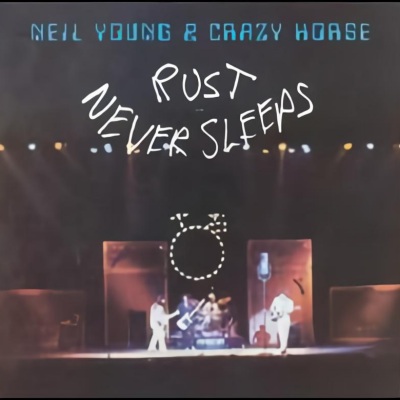
Rust Never Sleeps
搞了一辈子民谣的强人Neil Young,这是他1978年和Crazy Horse举行的同名巡演的现场录音,演出和唱片都大获成功,在朋克风潮越演越烈的时候,Neil Young用他的吉他和口琴作出了有力的回击,让听众们明白,好听的东西有时就是那么简单直接。专辑中不插电和插电的曲目基本各占一半,也从一个侧面反映出Neil Young矛盾的心态。 虽然是现场录音,但这张专辑在后期制作中非常认真,基本上去掉了现场的杂音,而且Neil Young等人的状态也十分出色,效果丝毫不亚于录音棚版。 这张专辑在滚石杂志选出的500张历代最强专辑中排名第350位。 by William Ruhlmann Rust Never Sleeps, its aphoristic title drawn from an intended advertising slogan, was an album of new songs, some of them recorded on Neil Young's 1978 concert tour. His strongest collection since Tonight's the Night, its obvious antecedent was Bob Dylan's Bringing It All Back Home, and, as Dylan did, Young divided his record into acoustic and electric sides while filling his songs with wildly imaginative imagery. The leadoff track, "My My, Hey Hey (Out of the Blue)" (repeated in an electric version at album's end as "Hey Hey, My My [Into the Black]" with slightly altered lyrics), is the most concise and knowing description of the entertainment industry ever written; it was followed by "Thrasher," which describes Young's parallel artistic quest in an extended metaphor that also reflected the album's overall theme -- the inevitability of deterioration and the challenge of overcoming it. Young then spent the rest of the album demonstrating that his chief weapons against rusting were his imagination and his daring, creating an archetypal album that encapsulated his many styles on a single disc with great songs -- in particular the remarkable "Powderfinger" -- unlike any he had written before.

